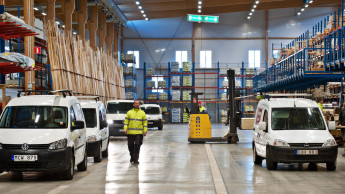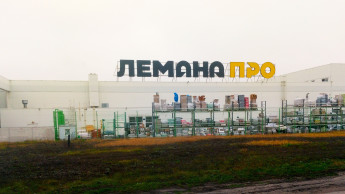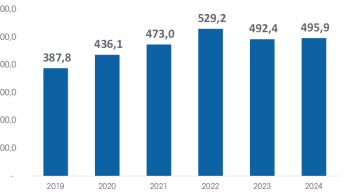Heading the field in Russian DIY e-commerce is Petrovitch, a St Petersburg builders’ merchanting house. In 2012 approximately six per cent of its revenue came from the internet. It is even expected that this year’s result will be far more than the planned ten per cent, or RUB 2.4 bn (approx. € 60 mio). Providing these rates of growth are maintained, the goal for 2014 is sales of five billion – 15 per cent of sales. This success story is unique in Russia so far, because not only the three market leaders are taking their time when it comes to online business. Though Leroy Merlin has indeed been operating a test project in Moscow and St Petersburg since the summer of 2013, this is only for selecting goods. The range, with not even as many as 600 items, is extremely meagre. Orders are home delivered only in and around Moscow, otherwise they have to be collected from a local branch. The pilot project is to be rolled out nationally in 2014. So far Leroy Merlin only realises five per cent of sales on the internet in Russia. Worldwide the figure is 17 per cent, yet Vincent Gentil, CEO of Leroy Merlin M Russia, believes his company’s current priorities in Russia lie in the offline trade. Obi and Castorama don’t even have a webshop yet, but they do offer their customers a delivery service and a catalogue on the internet. However, ordering online is not possible. “The multiples that operate right across Russia don’t go online because they realise clearly that they can’t provide good service and delivery options throughout the entire country.” This is the conclusion reached by Rinat Muhammedvaleev, general director of Trest SKM, which operates the Superstroy and Stroyarsenal DIY stores. Tatjana Romanowa, boss of the internet projects at Petrovitch, believes that the buying habits of consumers are another reason for the slow development of Russian online business in the DIY field. In her opinion, private end-consumers still want to see the range with their own eyes. On the other hand, professional builders have been loyal internet customers right from the start, happily taking advantage of bonus programmes for online purchases. The DIY retailers with regional operations are not exactly rushing to go online either: so far Trest SKM is the only one of the eight-member DIY-Union retail cooperation to sell product through the internet. This contrasts with the specialised building materials sector, where the situation looks quite different. Several webshops are already in…

Online restraint
The Russian DIY sector seems too preoccupied with expanding offline in the real world to open up a new building site on the net

 Menü
Menü










 Newsletter
Newsletter